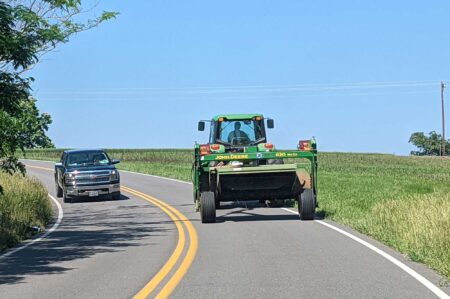By Nate Raymond
June 18 (Reuters) – The U.S. Supreme Court established rules of the road on Wednesday to determine when lawsuits challenging actions by the U.S. Environmental Protection Agency related to air pollution and greenhouse gas emissions should be heard by regional appeals courts or an appeals court in Washington that often hears regulatory cases.
The 7-2 ruling held that the U.S. Court of Appeals for the District of Columbia Circuit, and not the New Orleans-based 5th U.S. Circuit Court of Appeals, is the proper court to hear a lawsuit by small oil refiners challenging the EPA’s denial of waivers exempting them from national biofuel mandates.
That meant that the 5th Circuit had no business ruling in 2023 that the EPA during President Joe Biden’s administration had unlawfully denied the oil refineries waivers from a renewable fuels requirement that they blend ethanol and other biofuels into their fuel.
Yet under the same test to assess venue that the justices announced in the refineries cases, they ruled 8-0 that a different set of lawsuits by the Republican-led states of Oklahoma and Utah and several energy companies including PacifiCorp PPWLO.PK challenging the EPA’s “Good Neighbor” smog control plan were wrongly transferred to the D.C. Circuit.
Both sets of cases turned on a provision of the Clean Air Act anti-pollution law that designates the D.C. Circuit as the exclusive venue for cases over “nationally applicable” EPA actions and rules but leaves cases concerning only local agency actions to regional federal appeals courts.
Conservative Justice Clarence Thomas, writing for the Supreme Court’s majority in the refineries’ case, used his opinion to map out a test for how to interpret that provision and determine the proper venue for lawsuits challenging EPA actions.
Thomas said that while the law presumptively routes cases concerning local agency actions to a regional appeals court, they still must be heard by the D.C. Circuit “if a justification of nationwide breadth is the primary explanation for and driver of EPA’s action.”
That justification must supply a “core justification” for the EPA’s action, Thomas said, as it did in the case of the six refineries, whose requests for biofuel mandate exemptions were denied based on an interpretation of the Clean Air Act that the agency applied to all refineries regardless of their geographic location.
The ruling reversed a 5th Circuit decision in favor of the refineries on the merits after concluding that the EPA’s actions were local or regional in nature, not national.
“Allowing 12 different circuit courts to adjudicate SREs (small refinery exemptions) would result in a fractured and inconsistent body of law, causing chaos and confusion in the marketplace,” biofuel groups Growth Energy and the Renewable Fuels Association wrote in a joint statement.
Conservative Justice Neil Gorsuch, in a dissenting opinion joined by conservative Chief Justice John Roberts, said the test that the majority laid out was “both mistaken and likely to render simple venue questions unnecessarily difficult and expensive to resolve.”
They nonetheless concurred with the court’s decision to reverse the conclusion by the Denver-based 10th U.S. Circuit Court of Appeals that the case by Oklahoma and Utah should be transferred to the D.C. Circuit.
That case concerned a rule the EPA issued in March 2023 intended to target gases that form ozone, a key component of smog, from power plants and other industrial sources in 23 upwind states whose own plans did not satisfy the the Clean Air Act’s “Good Neighbor” provision.
Oklahoma and Utah were among 21 states whose air quality plans were rejected by the EPA under that policy. Numerous lawsuits followed, including by Oklahoma and Utah, who sought to challenge the decision in the Denver-based 10th U.S. Circuit Court of Appeals.
While the 10th Circuit held the case belonged in the D.C. Circuit because it concerned a national policy, Thomas wrote that the 10th Circuit could hear the case because the EPA’s action turned on state-specific factors.
The Supreme Court last year blocked the Biden-era “Good Neighbor” rule from being enforced while litigation in the lower courts moved forward. The Trump administration has said it plans to repeal the rule.
(Reporting by Nate Raymond in Boston; Additional reporting by Stephanie Kelly in New York; Editing by Will Dunham)


:max_bytes(150000):strip_icc()/Updated3BigThings-6-corn-ear-harvest-lightblue-4-7dcba3feecd84b7ea47c09f2338e7f9a.jpeg)
:max_bytes(150000):strip_icc()/LukeBryanPRphoto-84e3559aa0964e42b3ad96b2132eb349.jpg)
:max_bytes(150000):strip_icc()/SMinnesota1025-2000-83ff162cd24b4b0fb5065466fe80a0d5.jpg)


:max_bytes(150000):strip_icc()/supreme-court-USDA-9e398b0292044181a1f2335120be7c71.jpg)
:max_bytes(150000):strip_icc()/r4d092124_rrd1-5d0657ac040743a2a4c5ebf998902de0.jpg)

:max_bytes(150000):strip_icc()/Markets-1-Cattle-dramatic-up-5-0687ebaec7fc487bac9c10a7f442eea8.jpeg)